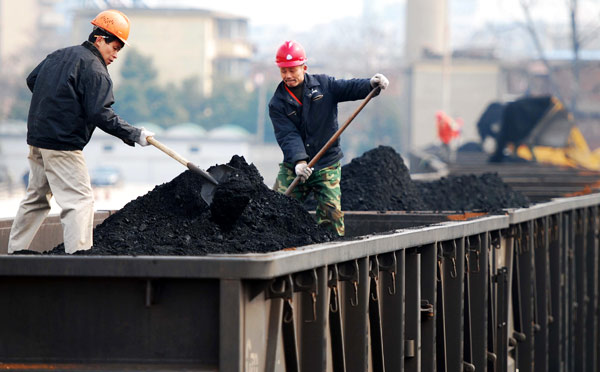Rio coal deal cements ties with China
 |
|
Workers load thermal coal at a storage base in Jiujiang, Jiangxi province. [Photo/Xinhua] |
Rio Tinto has tightened ties with China after selling its Australian coal assets to State-backed Yankuang Group for $2.69 billion.
Industry insiders stressed that last week's announcement goes beyond this deal, and illustrates the relationship between one of the leading multinational mining groups and the world's second biggest economy.
"Instead of a simple deal between two companies in the coal sector, it shows Rio Tinto is hoping to expand its Chinese iron ore market," said Mi Pengqi, an analyst at JLC Network Technology Co Ltd, a commodity information provider based in Beijing.
"That makes sense as China is one of the largest iron and steel consumers in the world," he added.
The Australian acquisition certainly created a buzz in the coal sector.
Yancoal Australia Ltd, which is part of Yankuang Group, will now take over Rio Tinto's coal mining operations in New South Wales.
"This is the transformative deal for Yancoal as we become the largest pure-play coal producer in Australia and a positive sign for continued investment into the local resources sector," Reinhold Schmidt, chief executive at Yancoal Australia, told the Financial Times.
But the decision by Rio Tinto will create more than a few ripples.
China is the Anglo-Australian group's fastest growing market and the fourth largest in the world.
As one of four mining giants and the second-largest iron ore supplier in the world, Rio Tinto produces a quarter of the iron ore globally.
"Rio is very close to China and they probably don't want to risk that relationship," Hunter Hillcoat, an analyst at Investec Plc in London, told Bloomberg.
Since the commodity downturn of 2014, major mining companies have been cutting spending and reducing capital debt.
In a move to slim down, Rio Tinto has decided to spin off its non-core assets to boost cash flow. "Iron ore, instead of coal, is Rio's main business," Mi said.
"It is in that sector that the company has a leading position and pricing power," he added.
The deal will also increase the pricing power for Chinese coal companies in the Asia-Pacific market, according to Yin Mingde, deputy general manager of Yankuang Group.
Yin pointed out that the acquisition would take Yancoal's coal reserves to 5.71 billion metric tons with annual production running at 42.79 million tons.
"The figures mean that the company will become one of Australia's biggest 'pure-play producers' of the commodity, with coal reserves and production operations in Australia just behind Glencore and Rio Tinto," Yin said. "With the expansion of production capacity, Yancoal would become an important Australian coal exporter to Japan and South Korea.
"It is expected to participate in the negotiation on steam coal between Japan and Australia," he added. "This will enhance the pricing power of Chinese coal companies."
The acquisition of Rio Tinto's two open cast mines in the Hunter Valley region, which is more than two hours north of Sydney, and railway and port assets, will boost Yancoal's presence.
For the past three years, the company has turned a profit even during the downturn of 2015 when coal prices crashed.
The deal is an important attempt to promote and implement the company's international investment strategy, and to strengthen its business overseas, according to a company statement.
"The transaction is expected to be officially complete in the third quarter of this year and it will increase Yancoal's competition ability greatly, even in Chinese coal market," Mi said.









